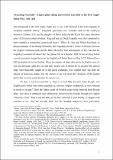Files in this item
‘Breaching neutrality’ : English prize-taking and Swedish neutrality in the First Anglo-Dutch War, 1651-1654
Item metadata
| dc.contributor.author | Murdoch, Steven Watt | |
| dc.date.accessioned | 2020-09-30T23:34:43Z | |
| dc.date.available | 2020-09-30T23:34:43Z | |
| dc.date.issued | 2019-05 | |
| dc.identifier | 256752458 | |
| dc.identifier | 2eda589b-4e0d-4a63-99ec-ff8b3117dc7e | |
| dc.identifier | 85063675632 | |
| dc.identifier | 000462948600003 | |
| dc.identifier.citation | Murdoch , S W 2019 , ' ‘Breaching neutrality’ : English prize-taking and Swedish neutrality in the First Anglo-Dutch War, 1651-1654 ' , Mariner's Mirror , vol. 105 , no. 2 , pp. 134-147 . https://doi.org/10.1080/00253359.2019.1589112 | en |
| dc.identifier.issn | 0025-3359 | |
| dc.identifier.other | ORCID: /0000-0003-3866-8658/work/60426798 | |
| dc.identifier.uri | https://hdl.handle.net/10023/20707 | |
| dc.description.abstract | This article considers the impact of English seizure of neutral Swedish vessels during the First Anglo-Dutch War. These actions were undertaken at a time when no bi-lateral diplomatic treaty existed between the two nations and thus the legal basis for such prize-taking was hotly disputed on both sides. Through an examination of extant sources in both England and Sweden, the article scrutinises a number of case studies in a period where the concept of any meaningful international maritime law remained primitive. It concludes with a review of the diplomatic machinations which sought to recover ships, goods or compensation in the years following the conclusion of the war. | |
| dc.format.extent | 261785 | |
| dc.language.iso | eng | |
| dc.relation.ispartof | Mariner's Mirror | en |
| dc.subject | Maritime law | en |
| dc.subject | Naval history | en |
| dc.subject | English history | en |
| dc.subject | Swedish history | en |
| dc.subject | Maritime history | en |
| dc.subject | Early Modern history | en |
| dc.subject | DA Great Britain | en |
| dc.subject | DH Netherlands (The Low Countries) | en |
| dc.subject | T-NDAS | en |
| dc.subject | SDG 16 - Peace, Justice and Strong Institutions | en |
| dc.subject.lcc | DA | en |
| dc.subject.lcc | DH | en |
| dc.title | ‘Breaching neutrality’ : English prize-taking and Swedish neutrality in the First Anglo-Dutch War, 1651-1654 | en |
| dc.type | Journal article | en |
| dc.contributor.institution | University of St Andrews. School of History | en |
| dc.identifier.doi | 10.1080/00253359.2019.1589112 | |
| dc.description.status | Peer reviewed | en |
| dc.date.embargoedUntil | 2020-10-01 |
This item appears in the following Collection(s)
Items in the St Andrews Research Repository are protected by copyright, with all rights reserved, unless otherwise indicated.

